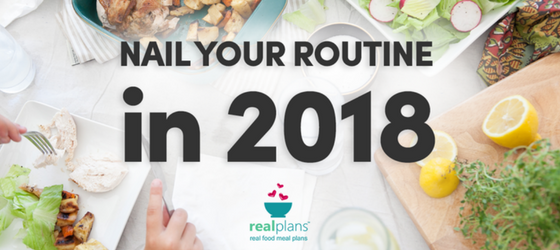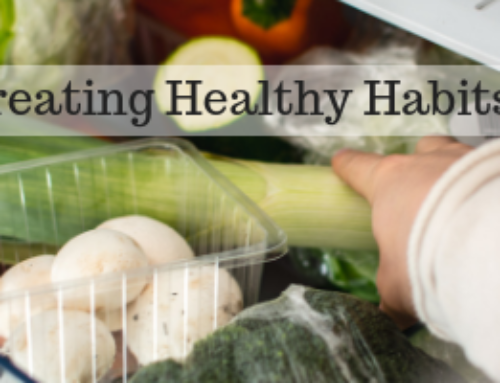I hope your New Year is off to a great start! Eating healthier in the New Year is a top priority for many of my clients. Making it into a routine through meal planning is one key way to keep that resolution come springtime, summer, and even fall. We have all had those days (or weeks) when we didn’t have a plan, and take-out food took-over our lives! Well today, I’m here to help. I am going to give you simple tips to make meal planning easy. I also want to share a meal planning app called Real Plans that can take all this information, and set it in motion—basically stream lining the process by making it easier and less complicated.
For most busy individuals and families, it makes the most sense to implement meal planning over the weekend when there is more time to devote to it. Plus, it sets you up for success the next week. (However, do it when it is most ideal for you.) I am going to break meal planning down into three phases, let’s dive in:
Planning – First, keep a running grocery list as you go through the week. When you run out of a staple food, put it on the list and forget about it. Do you feel your stress decreasing already? Start your planning early in the weekend, like Friday or Saturday morning. This helps to spread the whole task out over the weekend, and reduces overwhelm. Check what inventory you have in the fridge and pantry to see what needs to be used. Check the sales page of your grocery store. Check in with your family to see what they may like to eat the following week, and what their schedules are so you know how many family weeknight meals to plan. Refer to your favorite recipes to see what catches your eye. Refine your grocery list. Plan a few meals, but I don’t recommend planning all seven days. Leave a day for leftovers, and a day or two when you may wish to be spontaneous and/or eat out. Whew! Did you feel the stress decrease even more?
Shopping – the good news is that with a focused grocery list, you can get your shopping done much quicker. If you shop early in the day, you will also avoid the crowds, and be less apt to succumb to temptations that can be stronger later in the day when you are tired and hungrier. You can also avoid those aisles where you might be enticed to buy things that aren’t on the list, which also can derail your healthy eating plan.
Prepping – if you are spreading your meal planning out over the weekend, you can leave the prep for Sunday. Carve out an hour or two where you devote your time to prepping and batch cooking. Make it fun and play your favorite music, or catch up on podcasts. Look at the recipes you have planned for the week, and see what can be done ahead of time. It really depends on what you are cooking but it could include: washing vegetables, chopping up vegetables, baking a pan of chicken pieces, or boiling a pot of beans or eggs. (Note: if cooking a batch of beans for the week, then you will want to soak them overnight, so start them on Saturday). Some recipes can be cooked ahead of time to completion because they are easy to reheat and still taste great. You can plan to have fish early in the week, and prepare a marinade for chicken or other meat that you can use later in the week. Each weeknight evening, take a look at your plan for the next day, then put frozen food in the fridge to thaw if needed, so it is ready to go the next evening.
Practice makes perfect. If you fall out of the routine, just get back to it the following week. You will make mistakes, but mistakes just make you better! Do you know how many times I have forgotten to pull out frozen chicken to thaw? Too many times to count.
Last year, however, I discovered Real Plans, and I must say it has really helped me in terms of organization and consistency. I love it from a nutritional perspective because you can choose what foods you want in your plan and which you want to avoid. For instance, if you need to avoid sugar, wheat, and dairy, you can easily exclude those from your meal plan. Or perhaps you want to follow a particular diet like Paleo or Vegetarian, then you can opt to populate your meal plan with recipes specific to your diet. You can also import your own recipes to your “Recipe Box”. After you have decided what recipes you want to use for your weekly meal plan, it will create a grocery list, which you can edit based on what is in your fridge or pantry. You can choose how many meals you want to plan for in the week, and can include (or exclude) breakfasts and lunches. You can choose seasonal recipes, and even opt for how much time you wish to spend cooking. Can I hear it for recipes that cook in 15 minutes or less? And lastly, it gives you nutrition info so you can keep an eye on calories, protein, carbs, fat, etc. It really is quite an application. I was floored by how much it can do. You can check it out here.
If you have any questions about Real Plans, I am happy to answer. If you try it, I’d love to know what you think and see if you find it to be a helpful tool that makes meal planning fun. Just hit the reply button!
If you liked these tips, feel free to share with family or friends.






